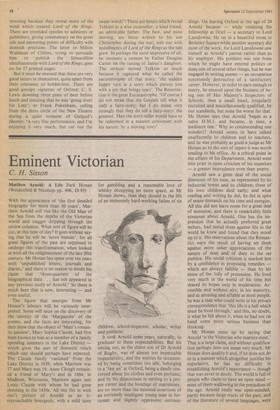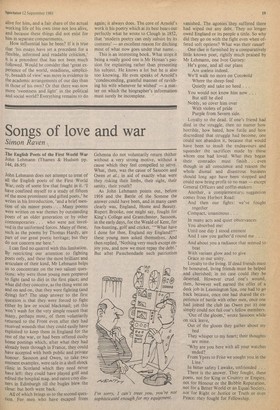Eminent Victorian
C. H. Sisson Matthew Arnold: A Life Park Honan (Weidenfeld & Nicolson pp. 496, 0.95) With the appearance of 'the first detailed biography for more than 30 years', Matthew Arnold will rise like the Old Man of the Sea from the depths of the Victorian world and stagger dripping through the review columns. What sort of figure will he cut, at this time of day? It goes without saying that he will be 'more human', for all great figures of the past are supposed to undergo this transformation, when looked at with all the enlightenment of the late 20th century. Mr Honan has spent over ten years with 'unpublished letters, journals and diaries,' and there is no reason to doubt his claim that 'three-quarters of the biographical data . . . has not appeared in any previous study of Arnold.' So there is much here that is new, interesting — and even useful.
The figure that emerges from Mr Honan's labours will be variously interpreted. Some will seize on the discovery of the identity of the 'Marguerite' of the poems, and the facts are interesting, for they show that the object of 'Matt's romantic passion', Mary Sophia Claude, had first been known to him as a member of a family spending summers in the Lake District — which gives the sort of domestic touch which one should perhaps have expected. The Claude family 'vanished' from the Lake District in 1839, when Matthew was 17 and Mary was 19. Anne Clough remained a friend of Mary's and in 1884, in Madison, Wisconsin, Matthew again met Louis Claude with whom he had gone shooting in the 1830s. All this fits in with one's picture of Arnold as an irreproachable bourgeois, with a mild taste for gambling and a reasonable love of whisky occupying no more space, as Mr Honan shows, than they should in the life of an immensely hard-working father of six children, school-inspector, scholar, writer and publicist.
It took Arnold some years, naturally, to graduate to these respectabilities. But his setting out, as the eldest son of Dr Arnold of Rugby, was of almost too impeccable respectability, and the worries he occasioned by being sometimes too idle, belonging to a 'fast set' at Oxford, being a dandy concerned about his clothes and even perfume, and by his dilatoriness in settling to a proper career and the bondage of matrimony, are no more than the minimal assertions of an extremely intelligent young man in fortunate and slightly oppressive surroun dings. On leaving Oxford at the age of 24 Arnold became — while retaining his fellowship at Oriel — a secretary to Lord Lansdowne. He sat in a beautiful room in Berkeley Square while another secretary did most of the work, for Lord Lansdowne saw himself as Arnold's patron rather than as his employer. His position was one from which he might have entered politics or done one of several other things, but he was engaged in writing poems — an occupation notoriously destructive of a satisfactory career. However, in order to earn enough to marry, he entered upon the business of being one of Her Majesty's Inspectors of Schools, then a small band, irregularly recruited and miscellaneously qualified, by our standards, but none the worse for that. Mr Honan says that Arnold 'began as a naïve H.M.I. and became, in time, a mediocre one.' Why so condescending one wonders? Arnold seems to have talked unaffectedly to children and to teachers, and he was probably as good a judge as Mr Honan as to the sort of report it was worth sending to his office. At a critical point in the affairs of his Department, Arnold went into print in open criticism of his superiors — a greater imprudence even than poetry.
Arnold saw a great deal of the social distresses of his time, as represented by its industrial towns and its children; three of his own children died early; and what reading and writing he did, he did in spite of many demands on his time and energies. All this did not leave room for a great deal of nonsense, and there is remarkably little nonsense about Arnold. One has the impression that he actually preferred great writers, had tested them against life in the world he knew and found that they stood up to it. His reservations about the Romantics were the result of having set them against more sober appreciations of the nature of man and of duty to the res publica. His social criticism is marked less by a confidence in proposing remedies — which are always fallible — than by his sense of the folly of pretension. He lived very much in the world of his time but shared its hopes only in moderation. Accessible and without airs, in his maturity, and as amusing and affable as most people, he was a man who could write in his private correspondence that 'this life is a hell which must be lived through,' and this, no doubt, is what he felt about it, when he had not on hand some more serious business than thinking.
Mr Honan sums up by saying that Arnold 'is the Victorian who matters most.' That is a large claim, and without qualification perhaps does not mean very much. Mr Honan does qualify it and, if he does not do so in a manner which altogether justifies his superlative, he has no difficulty in establishing Arnold's importance — though that was never in doubt. The world is full of people who claim to have an open mind — most of them wallowing in the prejudices of the age. Arnold really was open-minded, partly because large tracts of the past, and of the literature of several languages, were alive for him, and a fair share of the actual working life of his own time not less alive, and because these things did not exist for him in separate compartments.
How influential has he been? If it is true that 'his essays have set a precedent for a flexible, informed and readable criticism,' It is a precedent that has not been much followed. Would he consider that 'great experience of the world, steadiness, simplicity, breadth of view' was more in evidence in the academic arrangements of our day than in those of his own? Or that there was now more 'sweetness and light' in the political and social world? Everything remains to do again; it always does. The core of Arnold's work is his poetry which at its best bears out perfectly what he wrote to Clough in 1852, that 'modern poetry can only subsist by its contents' — an excellent reason for ditching most of what now goes under that name.
This is an interesting book. What stops it being a really good one is Mr Honan's passion for explaining rather than presenting his subject. He knows a lot but he is also too knowing. He even speaks of Arnold's 'condescending, grateful manner of ravishing his wife whenever he wished' — a matter on which the biographer's information must surely be incomplete.

































 Previous page
Previous page